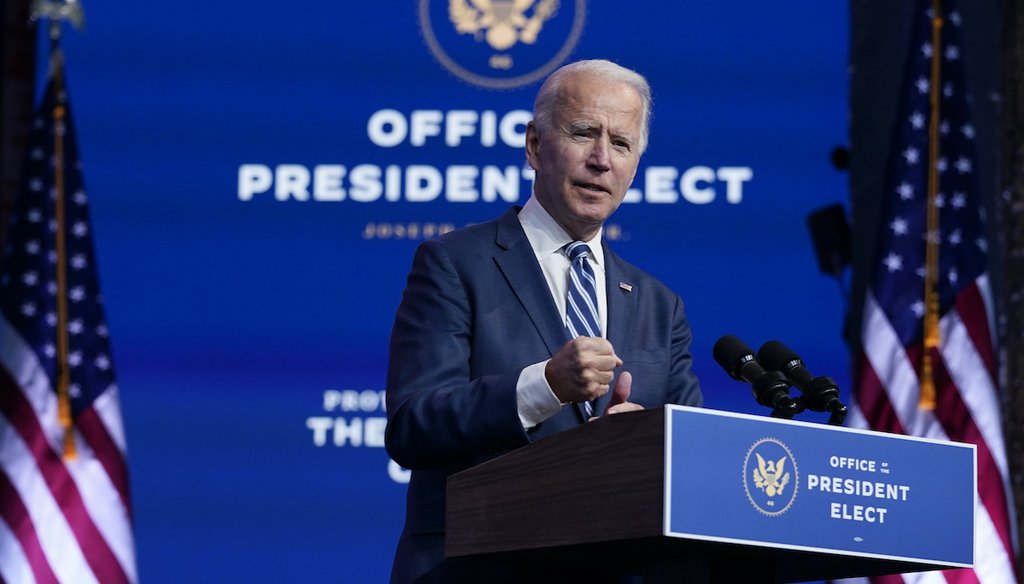Stand up for the facts!
Our only agenda is to publish the truth so you can be an informed participant in democracy.
We need your help.
I would like to contribute

President-elect Joe Biden speaks at The Queen theater on Nov. 10, 2020, in Wilmington, Del. (AP)
If Your Time is short
-
Joe Biden is called the president-elect because he is projected to win an absolute majority of electoral college votes in the 2020 presidential election.
-
Five legal experts we spoke with said that Trump’s refusal to concede has no bearing on whether Biden is the president-elect.
-
Journalists have traditionally referred to the projected winner of the election as the president-elect before the states complete their canvass and certification of the vote.
Joe Biden is the projected winner of the 2020 presidential election, and his lead in key swing states has only continued to grow since news outlets called the race for him on Nov. 7.
However, in a move unprecedented in modern American politics, Donald Trump has refused to admit that he lost the election, first asserting that he won and then baselessly alleging that massive voter fraud affected the outcome.
Facebook users are following suit, and with Trump’s lingering refusal to concede, we have seen several claims on social media arguing that it’s inappropriate to refer to Biden as the president-elect.
We asked five legal experts whether the lack of a formal concession has any impact on Joe Biden’s status as president-elect.
On this front, they were unanimous: No.
Sign up for PolitiFact texts
"A concession from the losing candidate has no legal significance one way or another. None," wrote Richard Pildes, Professor of Constitutional Law at the New York University School of Law, in an email.
"There's no legal requirement that a candidate concede, and a concession has no legal meaning whatsoever," wrote Joshua Douglas, a professor at the University of Kentucky College of Law.
"The lack of a concession speech does not mean that Trump has won the election; it simply indicates that he is a poor sport," wrote John Vile, a professor of political science and dean of the University Honors College at Middle Tennessee State University.
RELATED: How narrow was Joe Biden’s victory over Donald Trump?
The ritual of the modern concession began in 1896, when William Jennings Bryan congratulated his opponent William McKinley by telegram. According to Pildes, concession speeches allow losing candidates to acknowledge the right of voters in a democratic society to choose their leaders. They don’t fulfill any legal requirement necessary to begin the transition of power.
The legal experts told us that they consider Biden the president-elect because he satisfies the most common definition of the term. He was the person projected to win an absolute majority of electoral college votes after states completed enough of their unofficial vote counts to determine the winner.
In the most formal sense, Biden will officially become the president-elect after the General Services Administration initiates the transfer of power by "ascertaining" the election results and Congress officially counts the electoral votes on Jan. 6, said Pildes.
However, journalists have traditionally referred to the projected winner of the election as the president-elect before the states complete their canvass and certification of the vote.
In 2016, Trump changed his Twitter biography to read "President-elect of the United States" a day after the media declared him the winner of the election based on unofficial vote totals as reported by the states. A day later, Trump met with President Barack Obama in the White House.
Biden currently meets the same standard to be president-elect as Trump did at the time he changed his Twitter bio and met with the outgoing president.
RELATED: How we know Joe Biden won the 2020 presidential race
The Trump campaign is contesting election results in several battleground states. However, the experts we spoke with said that the campaign’s court actions are unlikely to change the outcome of the election.
"So far I see no evidence that these lawsuits will have any impact on the electoral vote total," said Rebecca Green, Professor of the Practice of Law and Co-Director of the Election Law Program at William & Mary Law School.
By any usual definition of the term, Joe Biden is the president-elect of the United States.
Our Sources
Associated Press, EXPLAINER: Why AP called the 2020 election for Joe Biden, Nov. 7, 2020
CNBC, Georgia will recount presidential election ballots by hand as Biden’s lead over Trump grows, Nov. 11, 2020
Donald J. Trump on Twitter, Nov. 9, 2016, accessed via Internet Archive Nov. 11, 2020
Email interview with Richard Pildes, Professor of Constitutional Law at the New York University School of Law, Nov. 13, 2020
Email interview with Joshua Douglas, professor at the University of Kentucky College of Law, Nov. 13, 2020
Facebook post, Nov. 13, 2020
Facebook post, Nov. 13, 2020
Facebook post, Nov. 12, 2020
Fox News, Biden wins presidency, Trump denied second term in White House, Fox News projects, Nov. 7, 2020
Interview with Rebecca Green, Professor of the Practice of Law and Co-Director of the Election Law Program at William & Mary Law School, Nov. 13, 2020
Interview with John Vile, professor of political science and dean of the University Honors College at Middle Tennessee State University, Nov. 13, 2020
Interview with Michael Morley, assistant professor at Florida State University College of Law, Nov. 13, 2020
New York Times, Biden flips Arizona, further cementing his presidential victory, Nov. 12, 2020
New York Times, 2020 presidential election results: Biden wins, updated Nov. 13, 2020
PolitiFact, Trump falsely and prematurely claims 2020 presidential victory, Nov. 4, 2020
PolitiFact, Trump’s tweet about 2.7 million deleted votes is baseless, Nov. 12, 2020




























